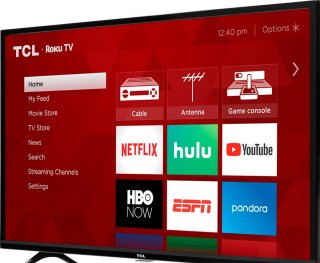Roku TV Was the Top TV Operating System in 2020
But will its streaming dominance continue into 2021?
In news that’s perhaps not surprising, Roku said Friday that Roku TV was the top TV operating system in both the United States and Canada, during the time period that amounted to nearly all of 2020.
Roku, in a press release, cited NPD’s Weekly Retail Tracking Service, which included data from between Jan. 5 and Dec. 26, 2020. Per NPD, Roku TV had 38 percent of the market in the United States and 31 percent in Canada.
In addition, ahead of CES next week, Roku announced that it is launching what it calls “a new wireless reference design,” for wireless soundbars, called Roku TV Ready Wireless Soundbar.
“This new design uses Roku’s proprietary audio technology to connect the soundbar seamlessly with any Roku TV model wirelessly,” the company said in a blog post. “It will offer impressive audio and video synchronization, have simple to set-up without the clutter of cords and can be controlled by one Roku TV remote. Even better, you can place it anywhere in the room.”
The first such soundbar, Roku said, will arrive at CES, from TCL. Also, Element will launch a 2.0 Roku TV Ready Soundbar and 2.1 Roku TV Ready Soundbar + Subwoofer later in January.
Roku made another announcement Friday, one that had been rumored earlier in the week: It announced that it has reached a deal to acquire the library of the departed, much-maligned shortform streaming video service, Quibi. Quibi’s shows will live on in the Roku Channel, becoming available soon, and is expected to stream for free for Roku users.
“The Roku Channel will soon be home to Emmy-nominated and popular shows, such as #FreeRayshawn, Chrissy’s Court, Die Hart, Dummy, Flipped, Most Dangerous Game, Punk’d, Reno 911!, Survive, and more, featuring stars including, Idris Elba, Kevin Hart, Liam Hemsworth, Anna Kendrick, Nicole Richie, Chrissy Teigen, Lena Waithe, and many others,” the company said in a blog post.
Quibi launched in the spring of 2020, around the start of the pandemic, with billions in backing and the participation of two veteran executives, former Disney and DreamWorks decision make Jeffrey Katzenberg and former HP and eBay CEO Meg Whitman, and the company secured the participation of a long list of A-list talent.
But Quibi soon became something of a laughingstock for many reasons, from its silly name to the folly of launching an app for people on the go during the months when everyone was stuck at home, to the inability to take screenshots. None of the shows on Quibi made any kind of cultural impact, and after failing to sell itself, the company folded in October, just six months after its launch.
Stephen Silver, a technology writer for the National Interest, is a journalist, essayist and film critic, who is also a contributor to Philly Voice, Philadelphia Weekly, the Jewish Telegraphic Agency, Living Life Fearless, Backstage magazine, Broad Street Review and Splice Today. The co-founder of the Philadelphia Film Critics Circle, Stephen lives in suburban Philadelphia with his wife and two sons. Follow him on Twitter at @StephenSilver.
Image: Reuters

